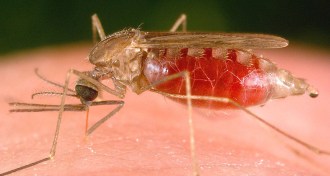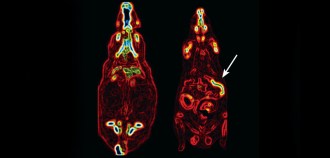Health & Medicine
-
 Health & Medicine
Health & MedicineRacial homogeneity in early childhood may affect brain
In lab study, kids who lived in single-race orphanages have difficulty interpreting emotions on faces with foreign features.
-
 Health & Medicine
Health & MedicineMediterranean diet may offset genetic risk for stroke
Compared to a low-fat diet, eating fish and olive oil kept blood sugar levels lower in people with a common diabetes risk factor.
-
 Health & Medicine
Health & MedicineCamels implicated as possible hosts of MERS virus
Antibodies to a mysterious pathogen that has sickened 94 people were found in camels in Oman and the Canary Islands.
-
 Health & Medicine
Health & MedicineVaccine protects against malaria in early test
A series of shots enables volunteers to fend off a live infection by the disease-causing parasite.
By Nathan Seppa -
 Health & Medicine
Health & MedicineHigh blood glucose levels linked to dementia
Elderly people with elevated blood glucose levels are more apt to develop dementia, whether or not they have diabetes.
By Nathan Seppa -
 Health & Medicine
Health & MedicineSpace-mapping neurons found in human brain
Grid cells may orient people in Euclidean space.
-
 Health & Medicine
Health & MedicineGoing out to lunch zaps mental focus
Sharing a midday meal with friends could lead later to errors at work.
-
 Health & Medicine
Health & MedicineFull moon may mean less sleep
Slumber waxes and wanes along with lunar rhythm, researchers find with people sleeping in windowless lab.
-
 Health & Medicine
Health & MedicineGastric bypass surgery causes sugar-burning gut growth in rats
The rapid improvement in symptoms of diabetes, seen in patients before weight loss begins, may be due to changes in part of the intestine.
By Meghan Rosen -
 Life
LifeA flash of light implants false memories in mice
Researchers alter rodents' recollections by exciting just a few neurons.
-
 Health & Medicine
Health & MedicinePermanent Present Tense
The Unforgettable Life of the Amnesic Patient, H. M. by Suzanne Corkin.
By Susan Gaidos -
 Health & Medicine
Health & MedicineWhat and when babies first eat may affect diabetes risk
Children at risk of type 1 diabetes are better off waiting until 4 months of age to consume solid foods.
By Nathan Seppa